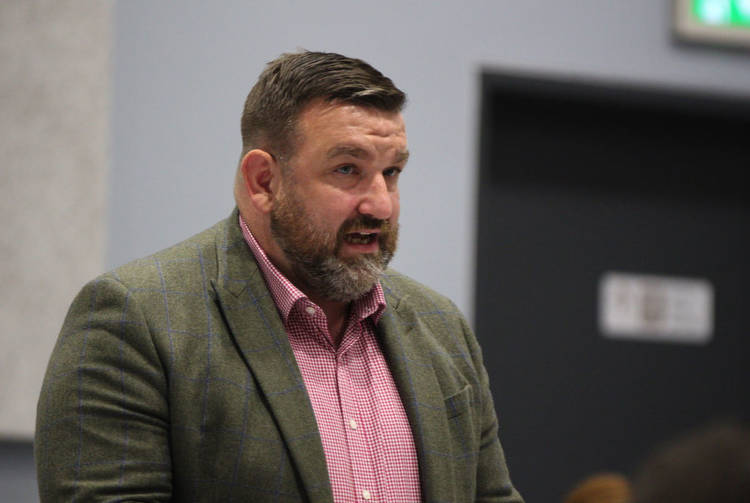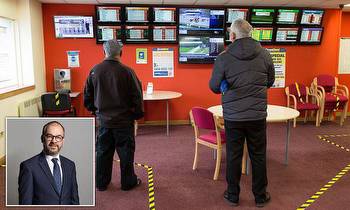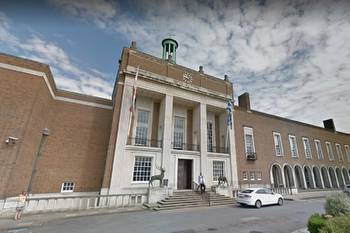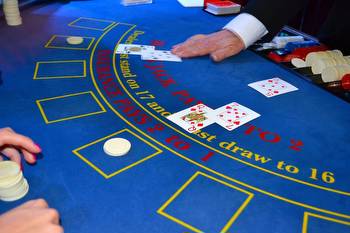Government accused of ‘blind spot’ over rampant rise of online gambling

Jonathan Simpson is the chair of licensing in Camden
LABOUR councillors say they are doing all they can to control betting shops and casinos – but can’t use their licensing powers to tackle the rise in online gambling.
They told a full council meeting that it was national government which had a “blind spot” about the dangers.
As betting has switched from torn up slips in once-smoky betting shops to a 24-hour bonanza online, gambling companies have enjoyed unprecedented takings.
Peter Coates, the co-founder of Bet365, which brands itself in adverts fronted by actor Ray Winstone as the “world’s leading online bookmaker”, has often used his money to donate to the Labour Party and backed Sir Keir Starmer’s leadership campaign with cash [see below].
Camden has been reviewing its own licensing policies over the past year, although there was only one response to a boroughwide consultation survey run by the council on what should be done.
It is tightening its rules on what operators will be expected to do if they want to have outlets in the borough, including showing how they are aware of the dangers for children and recognising problem gamblers and properly showing them how they can get help.
But chair of licensing, Councillor Jonathan Simpson, said a lot of the betting that takes place in Camden may be unseen, describing online gambling as “the biggest concern”.
He told last week’s meeting that Camden would be feeding into a government review of the 2005 Licensing Act enacted during Tony Blair’s time as prime minister.
“I really and sincerely hope that as part of this White Paper, which Camden certainly will be responding to, the government doesn’t drag its feet and greater regulates the sector because I think there is a high need for doing that,” he said. “I really do worry about the number of people in the borough who could be getting into substantial amounts of debt because of online gambling and gaming.”
His colleague Labour councillor Liam Martin-Lane added: “It is a blind spot in national regulation. I think we could do with a lot more leadership on this.”
The New Journal reported in May how the council had charted a rise in the number of people trying to cover bills amid the worsening cost of living crisis by trying to win money. The government has already limited the stakes which can be bet on roulette machines inside betting shops – known as “fixed odds betting terminals”. The same restriction does not automatically apply for slot games played online.
Betting firms can no longer accept funds from credit cards and are now expected to continually review customers’ spending and ask them to provide bank details if they suspect somebody’s gambling has become unaffordable.
Some companies have faced fines for not going far enough, but critics say these losses are only a dent in their overall takings and the government is relying on companies being good operators.
Banning gambling adverts on television during football matches has been criticised as only a minimal measure.
Councillor Lorna Greenwood said gambling should not only be looked at through licensing rules – but also considered a health issue. “A statistic in the report that I wanted to highlight is that one in four people aged 18-49 expect to increase their gambling in the coming months due to the cost of living crisis,” she said. “And some of you will have seen that just a few weeks ago the NHS announced that it was doubling its gambling addiction clinics in the UK after referrals increased by more than a third on the previous 12 months and up by four-fifths on two years.”
HELP AND SUPPORT
GamCare offers free information, support and counselling for people who have problems with gambling in the UK.
It runs the National Gambling Helpline (0808 8020 133) and also offers face-to-face counselling.
The helpline is free and open 24 hours a day, seven days a week.
Hotline to the bookies?
LABOUR councillors say they are looking for more ‘national leadership’ from government over online gambling – but perhaps some of their own friends and colleagues could lend a helping hand. After his success in the Labour leadership campaign,
Sir Keir Starmer declared a £25,000 donation from Peter Coates – the co-founder of betting behemoth Bet365.
Mr Coates is a long-term donor to the Labour Party, although did provide financial support during the time Jeremy Corbyn was leader. Other shadow cabinet members have received donations from figures who have at some stage made money from the gambling and gaming sector.
The Labour team at Westminster has previously defended the source of the funds delivered to Mr Starmer, with the view that Mr Coates is a long-term member who can donate like any other supporter. Culture Secretary Lucy Powell has also talked up how much tax he has paid on his earnings.
There is nothing illegal about accepting donations as long as they are declared. Labour’s links with the gambling history are long-running.
Former deputy leader Lord Tom Watson – recently approved for a peerage by Mr Starmer – is now a paid adviser to Flutter, which owns Paddy Power and Betfair.

































